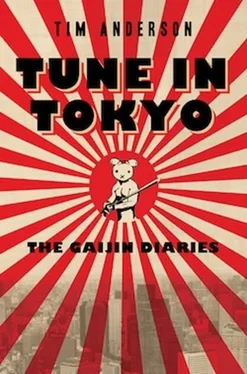For a few precious minutes, these songs written by two bighaired girls from Seattle are my own, because no one in the room (or in their right mind) knows them like I do. Not even needing to read the lyrics on the television screen, I can close my eyes and devote myself totally to creating an atmosphere of naked intimacy and flawless grace for my audience. And unlike Bob, I’m not afraid to use a falsetto if I have to. Which I do. Often.
It’s not Carnegie Hall, but it’s not the size of the arena in which you sing, it’s the motion of the emotion when the notion hits your ocean. Or whatever. Anyway, no one really cares when you’re finished. I’d like to say they’re stunned and breathless when I reach the end of my song with a fist in the air, my head back, and the microphone held upside down above my gaping mouth as it wails, “How do I get you alone?! Alone! Aloooooooooooooooooooooone!” It would be a lie, as everyone is already scrambling for the song directory and the remote control like a bunch of attention-starved Mariah Careys, ready to enter in their next musical choice.
In short, I’m comfortable with being a selfish bastard in a karaoke box. I’ll swipe the song catalog out of a bitch’s hands if I have to. But, of course, this is Japan, so one should never get too comfortable. And sure enough, when I go to karaoke with my business students, I learn that, sadly, just because you’re blissfully drunk doesn’t mean everyone is dying to hear your interpretation of Juice Newton’s “Love’s Been a Little Bit Hard on Me” without at least joining in with a little percussion or backing vocals, even when they don’t know the lyrics! Yep, in this curious country-or at least among my business students-karaoke is an activity for the group to enjoy together, not one at a time, like God intended. People can all join in the fun, unwind, relax, get drunk, laugh at each other’s vocal shortcomings, and, as one of my pro-karaoke students once put it, “be very too happy.” This is surely how they’d done it in Eastern Bloc countries during the cold war, in their communist karaoke labor camps.
It all happens one night after class. We’re drinking at a company party for a few hours, and once everyone is lubed up enough to start suggesting, nay demanding, that we proceed immediately to a karaoke box, we make a break for it. We all pile into a room, sit down, and order some drinks. Mr. Takeda immediately punches in “Twist and Shout,” one of the easier Beatles songs for Japanese to sing, and he and Yukihiro begin belting it out (“Shek eat shek eat shek eat bebe now!! Tsuist-oh and shout-oh!!”) while Mr. Yamamoto backs them up on tambourine and everyone else heaves glasses full of beer into their mouths and cheers along.
Next comes a Japanese song by Utada Hikaru. A few of the guys sing this one, often passing microphones and swapping instruments with each other. I smile and laugh, but inside I’m wracked with disapproval.
“Why isn’t Junichiro demanding that everyone else shut up so he can sing the song by himself?” I wonder. “Does he not know how you’re supposed to do it?”
Mr. Takada asks me what I want to sing, and I start looking through the book for something good, ready to show the room what I can do. Though I see many that tickle my fancy, like the Eurythmics’ “I Need a Man,” Pat Benatar’s “Hell Is for Children,” or Madonna’s “Like a Virgin,” they don’t seem terribly appropriate, and I don’t want to bring the festivities to a crushing halt, so I settle on “Piano Man” and bring the house down with my amazingly accurate (to them, at least) imitation of Billy Joel. Problem is, they all sing along (three of them into microphones!), jingle their tambourines, click together their drumsticks, and generally make a huge racket. So even though it is my song, really, since I chose it, the entire room felt like they could just barge in at any moment like this was some sort of hippie jam session. Soon, Takada starts plugging in songs for me to lead them in, from the Rolling Stones’ “Wild Horses” and the Monkees’ “Daydream Believer” to Bette Midler’s “The Wind Beneath My Wings.” And everyone backs me up. Folks who just a few sober hours ago stared at me blankly when I asked them a question in front of the class, not even able to bring themselves to say, “I don’t understand,” are now fully outside their classroom shell, passing the microphone, shaking the maracas, clapping their hands, and “whoop whooing” like it’s showtime at the Apollo.
And wonder of wonders, by the time we get to David Bowie’s “Let’s Dance,” I am totally digging it. The selfish, attention-starved diva in me retreats into the background and I become just another member of the gang. The only white guy, yes. With better pitch and melodic sense, sure. And a native understanding (more or less) of what Bowie means when he says “under the moonlight, the serious moonlight”-absolutely. But whereas before I wouldn’t have been happy without my moment in the sun, now I’m grooving with this ecstatic communal experience. No one is the center of attention, and nobody feels embarrassed, because each of us understand the deep-seated human need to sing our favorite songs into a microphone and be backed up by a decent sound system and some swirly lights.
After sipping from this cup of cooperation and collaborative energy, I decide that perhaps the group therapy of Japanese-style karaoke is not so bad. But can I really leave the “me first” mentality of my previous karaoke outings behind? With a group like my fellow teachers, you might try to sing along, but it’s someone else’s solo you’re stealing. And the threat of violence is real. With my business class, the microphones would be passed, the tambourines traded, and the choruses sung, anthem-like, by everyone. It’s an arrangement I’m just not sure I can ultimately be happy with. I’ve turned Japanese a bit, yes. But have I turned that Japanese?
I think we all know the answer. The lure of the spotlight is too great for a deluded fame whore like myself. Yes, though we can sometimes come together over a good Beach Boys, Elvis, or Madonna tune, we selfish gaijin tend to use karaoke as an opportunity to stand out from our peers rather than harmonize and clap along with them, and to assert our sometimes offensive individuality. We want to sing our lives and justify our existence. We sit and wait expectantly for each person’s song to hurry up and finish so we can stomp a stiletto on the carpet and announce ourselves to the room, if not the world. We want to show what we know and prove unequivocally to ourselves and to everyone else in that tiny soundproof room, “Dammit, I exist, and I’m gonna fucking sing about it, so hand over the goddamn microphone, bitch. And cool it with the backing vocals, please. We’re not Martha and the friggin’ Vandellas, for God’s sake!”
Final Summary:
Total # of pairs of chopsticks used (for eating): 1,261
Total # of food items dropped on floor (while eating): only 19!
Total # of times waitress brought me a spoon or fork unasked: only 3!
Total # of visits to Tokyo Disneyland: only 2!

In which our hero’s adventure reaches its musical climax and then everyone goes home with their ears bleeding.
–
Concert for Viola and Piano
Music by
Johannes Brahms
Tim Anderson, Viola
Toru Miyazaki, Piano
Sunday, July 22
3:30 p.m.
Steinway Salon, Tokyo
1-6 Kanda Surugadai, Chiyoda-ku
–
The flyers are all printed; the studio space rented; the sheet music dog-eared, ink-blotted, and bloodstained. It’s time for my great Tokyo debut-as part of a recital given by my friend Toru and me. It took a fair amount of cajoling on Toru’s part to get me to agree to this public performance, as standing on a stage in front of a roomful of sober people ready to get all judgy gives me the flopsweats under normal circumstances. Standing on a stage trying not to drop my viola in front of a roomful of blank-faced Japanese people who are probably expecting a competent viola player, having seen the fancy font on the flyer-now this really puts the fear in me. And facing these same people after I choke, throw my viola onto the floor, and scream, “I can’t do it! Everyone knows it! My thesis advisor was right! I’m a fraud!” and then jump stage left, get tangled in the curtain, fall over, and pee in my pants-this could be a real career killer.
Читать дальше













